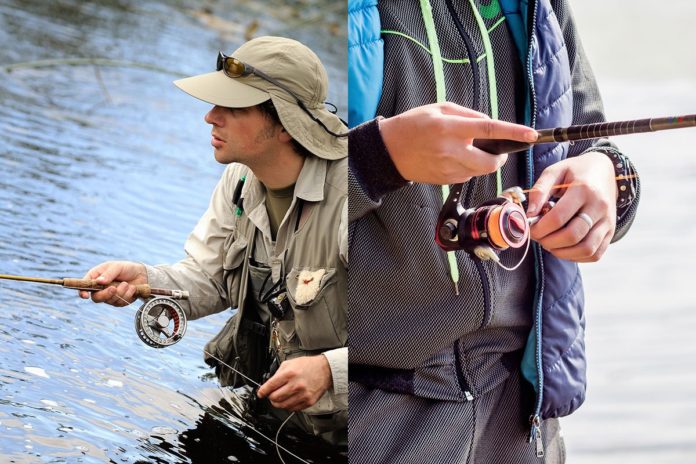It’s the age old battle: fly fishing vs. conventional fishing and we have all of the answers right here.
Rifle vs. shotgun, crossbow vs. compound bow, smallmouth vs. largemouth bass. The argument will never cease, and why should it?
In a day and age when it seems like we can’t stop hollering at each other over the most basic things, we’ll try to get to the bottom of an age old question in the outdoor world. Which is better, fly fishing or conventional fishing?
You can catch the smallest, most wary fish with the slightest of fly fishing equipment, as well as some of the largest and most aggressive of the game fish species if you use hefty rods and reels. So why would you ever do anything but fly fishing?
Well, not so fast, father of the fly rod, because those of us with the spinning and casting combos would like to have a word with you.
What would you do with $5,000? Our Ultimate Hunting Package Giveaway ends December 31, 2020!

If you can spool up a baitcasting or spinning reel with some of the best braided line that your hard-earned money can buy and latch into an endless variety of large and predatory salt and freshwater fish, then conventional fishing would seem the only logical choice.
Just hold your water for a minute, you comrade of the casting reel, because there’s a lot more to it than that.
Anglers using conventional fishing gear have been known to rig and use artificial flies, including dry flies, nymphs, and even streamers at times. Plus, fly fishermen like my own revered grandfather have used fly rods to catch some of the biggest northern pike you ever saw. So what are we arguing about?

Both forms of fishing try to capitalize on the common food source for different species of fish. Hopefully that means a lot of fish, but that’s besides the point.
Let’s take a moment to have some fun, look at the differences, and maybe even poke a little fun at each other. We are all a part of the same fishing fraternity, and no one fights like brothers and sisters.
The biggest difference is in the gear, and we’ll cover that, but there seems to be a mentality and attitude difference that leaks into the discussion.
In the end, if you have a preference for one or the other, so be it. Just remember that if it works, that’s all that really matters.
Fly Fishing
Bass Intro
Have you checked out the redesigned Orvis Fly Fishing Learning Center? This week’s new video content is all about bass-both largemouth and smallmouth, featuring advanced tactics and set-ups. Check it out: https://howtoflyfish.orvis.com/
Posted by Orvis Fly Fishing on Tuesday, October 6, 2020
Is there an outdoor subject out there that has been written about more than fly fishing? It’s what the revered author Izaak Walton called “The Contemplative Man’s Recreation.” Fishing with fly gear can be just as exciting and thrilling as with regular gear, sometimes even more so. A lot of fly fishing is done in clear water that isn’t over the angler’s knees, meaning you can often see what’s going on under the surface.
Fly fishing calls for stealth, patience, and a keen eye. Fishermen need to know what it is a fish is doing and why. While common convention may tell you that fly fishing is only for cold water species like trout and salmon, the fact remains that tarpon, permit, bonefish, and even bass, pike, and muskellunge are increasingly caught with fly gear.
The downside is that fly fishing calls for a more tempered approach and tends to be a more learned experience due to some of the intricacies involved. Fly casting is not an easy thing and must be learned with patience and proper instruction over time. Beginner flyfishermen can simplify things starting with traditional methods like Tenkara, which uses only the rod, line, and fly to catch fish.
There are extra tools and accessories needed to fly fish, like fly line, forceps, dry fly floatant, leader straighteners, and perhaps a fly fishing vest to hold your own flies, leader, and tippet.
Fly fishing has a long history dating back to the Macedonians, the Japanese, and even anglers from the Western European countries of Scotland and Ireland.
Now, fly fishing has evolved into one of the greatest and most talked about methods to catch fish that we know of. It’s no wonder hardcore fly anglers often won’t fish any other way.
Conventional Fishing

Ever since we laid our hands on the first rod and reel combo that mom and dad bought for us, we’ve been hooked. Raise your hands if you ever took one of your first ever rigs out into the backyard and took a few casts, pitched into the swimming pool, or flipped a jig into a bucket.
Bait casting anglers and spin casters alike can do it with one hand, and with practice, place it on a dime.
Learning to cast with conventional gear is much easier than learning to cast a fly rod, and many will tell you that it catches more fish. That’s debatable, and certainly dependent on conditions, but it is an argument often made.
That being said, fishing conventionally is to our psychological advantage since the success we have creates a positive attitude in all of us. It’s great for beginners and youngsters when they’re just getting started. Kids take to this style of fishing like a fish to… well, you get the point.
Spin Fishing and Baitcasting
Many fishermen started off with the more demanding casting rig, mainly because it came along first. The original baitcasters were difficult to use and prone to severe backlash. Once this issue was resolved with today’s technology, we were convinced that fishing had gone to heaven, and largemouth bass everywhere started trembling.
Spinning rigs are among the simplest, easiest to use fishing gear out there. Kids can learn to cast a spinning reel over the course of a morning, using many different lures and baits. If you tie on a bobber, things become even more simplified. When you see the bobber sink, set the hook!
Maybe the best part is the fact that both spinning and casting rigs can catch fish using live bait with the simplest of changes to the setup.
From crankbaits to spinnerbaits the conventional rig has the ability to throw, cast, pitch, flip, troll, or otherwise put your bait into the water and in front of fish in the best possible way, bar none. Conventional fishing can catch anything that a fly fishing rig can catch and be almost as subtle about it.
Spinning rigs can use the lightest of lines and the most finesse-friendly baits out there. Casting rigs can load up with the heaviest fishing line and the heaviest lures, dredge the depths or be cast into the middle of the gnarliest cover to pull fish out.
Though a fly fisherman can certainly change things up, it’s tough to compete with the versatility at hand when you use a conventional fishing set up.
Fly Fishing vs Spin Fishing and Baitcasting
https://www.facebook.com/LuckyTackleBox/videos/944721325686236/
The differences are as numerous as the similarities. Fly fishing can be described as the subtle beauty of creating a myth for the wily fish. It is the beauty of outwitting your opponent by your own guile and wits.
Conventional fishing is where the rubber meets the road. Once technology began to help us outsmart the fish, many of us never looked back. It wasn’t enough to fool a fish into thinking that our offering was real. Now we had to catch that fish’s daddy, and then its grandaddy! We hired charter captains to take us deep sea fishing in the farthest saltwater reaches, in search of fish the size of a small car.
Once they saw what we were doing, the fly fishing crowd wouldn’t be outdone. They put together rigs that could handle big king salmon the size of your leg. Things kept advancing, and they haven’t slowed much at all.
To be completely honest, there’s a lot to love about both styles of fishing.
The Last Word

Fly fishermen fool the wariest fish.
Conventional fishermen hook the most monstrous fish.
Fly fishing is an art form.
Conventional fishing takes muscle and sinew.
We’ve said it many times: if it works, do it. Nowhere is this more important than with fishing. Whatever your method, whatever your approach, there is a fishing rig to fit your style. The best possible scenario is that you not only try both in your lifetime, but use both methods for the rest of your lives.
Angling is a brotherhood, and as we’ve said, no one fights like family. Whether you are using your fishing rod for catching baitfish or catfish for the first time, it doesn’t matter what fishing technique you use, only that you enjoy yourself. Fly anglers and regular fishing enthusiasts alike can agree that the know how may be subjective, but the results are the same for whatever types of fishing you do and whatever body of water you fish.
The casting technique may be different and the artificial lures a world apart, but the fishing method that you use is entirely up to you.
Need to do some gear shopping? Fly fishing and conventional gear can be found at FishUSA.

Looking for a little more or even hot lunch for your hunting blind? Follow my webpage, or on Facebook and Twitter.
NEXT: FLY FISHING FOR BASS: HOW TO IMPROVE YOUR KNOWLEDGE
WATCH
oembed rumble video here
Credit: Source link































